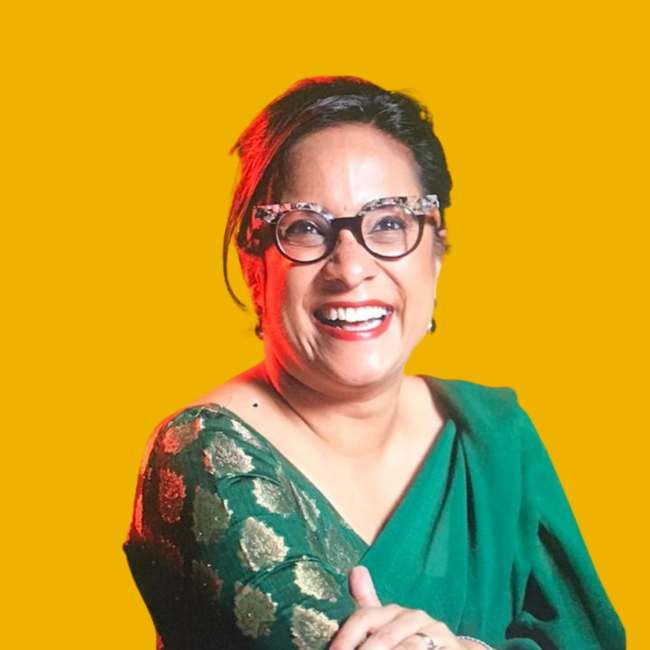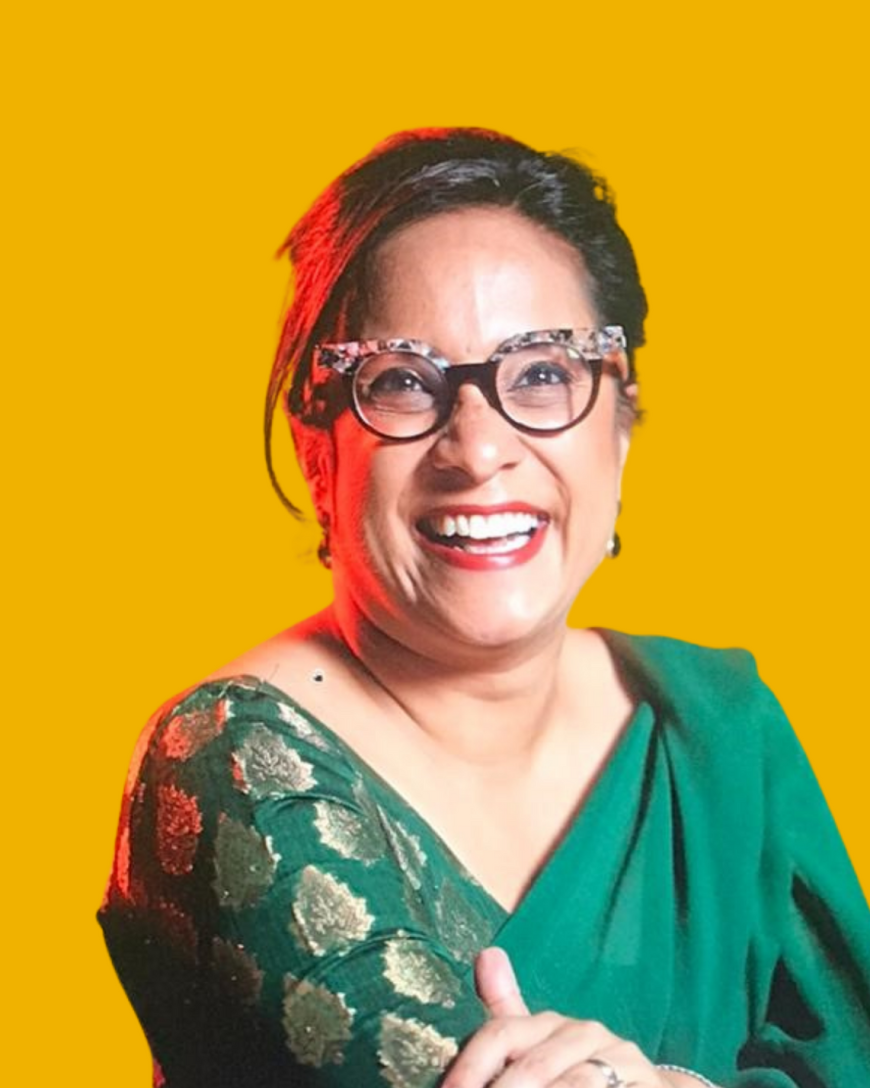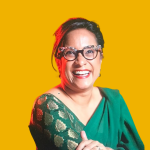Curated conversations with data and AI for social impact leaders on their career journeys
Pathways to Impact is a series of conversations with data for social impact leaders exploring their career journeys. Perry Hewitt, CMO of data.org, spoke with Neera Nundy, Partner and co-founder at Dasra, about the importance of investing in data talent to build the data for social impact field.
By founding Dasra, you’ve played a huge role in the social sector from awareness to partnerships to funding. How did you personally make that first foray into data for social impact?
Mine was not a straight path — and I’m so inspired by folks that do have straight paths! I think you might see more direct paths to social impact roles these days than in my time. I was a child of Indian immigrants and grew up in Canada. My parents were engineers, and my sister and I were supposed to do science. Frankly, I thought I was going to be an actuary; I studied math, and I didn’t know of any professions other than actuarial science. My aspiration was to just have a job with a salary, which I know sounds quite silly. But my whole life was based on, ‘Will I get hired?’
It was during my undergraduate studies in Canada that I was first exposed to something called business. I did a dual degree in math/statistics, and in business. At that point, I realized that there were interesting applications of math and statistics in the real world. Business was a place where I could leverage both the stats skills and the softer skills that I was developing.
From college, I went into investment banking: mergers and acquisitions at Morgan Stanley in New York. This was in the late ’90s, when markets were hot and analyst programs had just started. Looking back now, at every stage in life one gets more and more exposed to possibilities and opportunities. I began to see opportunities — but at that stage I wasn’t able to find the courage to take a risk, even though I was seeing everything around me begin to change, especially in the social sector.
Around the same time, my mother moved back to India and started a boarding school for Adivasi children. Adivasis are indigenous peoples who don’t have access or privilege; many don’t even have access to school. She started this school at IIT Kharagpur (Indian Institute of Technology), where she and my dad are both alumni. This school was my first exposure to rural India, where there wasn’t this kind of basic access to education.
At the same time, I read The Price of a Dream by David Bornstein about microfinance, Grameen Bank, and Muhammad Yunus. That’s where I started to see a possibility at the intersection of finance and development. Microfinance was an amazing way to empower women to give them not just financial skills, but the power to save and be in control of finances. I realized how all this can converge and be intersectional, and considered where I might play a role in this intersection of corporate and financial empowerment.
I came up with the idea of Dasra while still at Morgan Stanley. That’s where I met my husband, Deval, who was also an analyst. We were working 100-120 hours a week at that point, and that pace and the kind of work we were doing as junior analysts started to make us question our purpose. Why were we focusing so much energy on PowerPoints and Excel spreadsheets?
We decided we needed to do more and make a change. We wanted to find a way to support organizations through our funding and management skills; we believed there was a valuable intermediary role to be played, and that was the genesis of Dasra.
Deval, my husband, actually started working first at Dasra; I had been accepted into Harvard Business School, something I never imagined would be a possibility. At HBS, I learned and gained courage from the School’s focus on whole leaders that make a difference in the world. I joke that I was brainwashed there! All this privilege of education and exposure gave me a sense of responsibility. After graduation and a brief stint in banking, I joined Dasra full-time.
Our ability to accelerate social change and systems change will come from an investment in accelerating data talent and capacity, without a doubt.
Neera Nundy Partner and Co-Founder Dasra
When you think about your work at Dasra, what specific problem are you seeking to solve? And how does data play a part?
What we’re trying to drive in India is: how do you invest in systems change? It was relatively simple in the beginning when we focused on how to support a nonprofit. But soon we pushed ourselves to achieve scale, and we realized you needed to have a systems approach.
Over the last 22 years, we’ve seen value in a shift to focus on collaboration, to focus on being an aggregator, and on working closely with the government. Because in India this collaboration is essential for scale. Government is the biggest funder, the biggest player in education, health, and other development areas: one has to have them as a key partner.
During that time, we’ve landed what’s really core to our mission: driving collaborative action to accelerate social change. Our vision is to transform India and help a billion thrive with dignity and equity.
Data plays a vital role in our work, but it’s been a journey for us and the sector. It can be a bit of a buzzword: everybody feels we’ve got to say data, but what do we actually mean? We’re continuing on this journey but we’re still very nascent in India with not only how data is collected, but how we are using it for learning, decision making, and improving our work.
Lately, we’ve been focused on what we call data empowerment, which is bringing the collection of and the utility of data directly back to the communities so that those feedback loops are stronger. We want to ensure the data is in the hands of those who can demand what services they need from the government or from the NGO sector. We believe that for using data in the service of society, it is important to reframe boundaries by involving communities and building trust.
A challenge we face is the real underinvestment in the infrastructure that is needed to collect the data which continues to remain siloed, unavailable, and lacks credibility. Infrastructure is not an obvious place for funders. And even if you put in piles of cash for this kind of work, the capacity of organizations and the sector to absorb it is very weak. That brings us to the work that we’re doing in data for good, with Bloomberg and other players, which acknowledges that data capacity needs to be built to empower communities. The opportunity is enormous when you see how advanced the private sector is in the use of data, data science, and AI. It’s clearly not the same in the social sector. Building that bridge between these sectors and finding a way to accelerate that talent and capacity for the social sector is a real opportunity here in India, given that data has often been considered the new oil.
Part of the Pathways to Impact series
Did you encounter any obstacles to pursuing social impact work?
I think the biggest challenge is that it’s actually not about ideas. And I may even venture to say it’s not so much about innovation, although we keep saying that. The challenge is actually taking an idea or innovation and delivering and executing it.
We as a sector underplay the importance of core skills like project management, data management, and people management. Building teams is critical. All of these things are often taken for granted in the social sector when you have a big idea and passion and inspiration to effect change. You need to invest in the innovation side, but also in the nuts and bolts of what it takes to execute.
Another obstacle is figuring out the right balance between what to build yourself, and where and how much do you partner. We don’t do enough partnership in the social sector, even though we’re far more resource-constrained.
Finally, the pace of change can be frustrating. You’re always trying to shape outcomes. For example, in the work that we do with adolescent girls, we seek a common set of outcomes: delaying the age of marriage, delaying the age of first pregnancy, and keeping girls in school past grade 10. And then looking at increased agency and employability.
Clearly, it takes generations for these kinds of outcomes to move. So, there’s a lot of work to be done — with data, and otherwise — on proximate indicators, for people to actually have a sense if something is moving in the short term, and is ultimately going to lead to that outcome. Social change takes time.
Here in India, this work is affected by patriarchy, cultures, and traditions, and none of that changes overnight. That has been a challenge for myself and for the sector broadly: staying motivated and on track for the outcome despite a slow pace of change.
Has being a woman leader posed a challenge?
In certain ways, it’s been a challenge. But I have a double challenge of not just being a woman but also one with an accent. Is she really Indian? Is she a foreigner or not?
It works both ways: that double challenge can also be a form of privilege because I don’t have to fit in. My approach has been to figure out where to play and where my husband, Deval, might be more effective. Sometimes it’s not about making the point about gender or pursuing that level of equality. It’s ultimately pursuing, well, what’s going to get us there?
Times have changed, and it is better. But I think what’s incredible about India, not in a good way, is that the patriarchy is strong everywhere. It doesn’t matter what caste, what class, what status you come from. There is still a stigma about women working.
Do you have communities of people or resources that bolster your work? Are there communities or networks that not only strengthen you, but also you can go to when wrestling with a challenge?
There aren’t many networks one can easily tap into for the social sector. I recognize that I’m speaking from a tremendous amount of privilege that I am able to have a broad network of access to bankers or to Harvard alumni. It’s been great to see over the past 20 years, the openness with which these kinds of networks now want to engage in the social sector. People see an opportunity for purpose, to use their networks to make a difference in some way but are lost on where to start. That’s a role we’ve played, in making those connections.
But I’ve learned to be patient, because along with all that desire for purpose comes a tremendous amount of arrogance. I think it’s humbling for a lot of these networks and folks who start to engage with the social sector to see some of these challenges and come in and not be able to effect change. Maybe you can move fast in an M&A deal but if you’re trying to advance adolescent girls’ education, there’s a lot more complexity.
Other networks for us include corporate networks, like NASSCOM (National Association of Software and Service Companies), which brings technology companies together, or Family Business Network because we work a lot with families and family offices. There’s demand for purpose when they have liquidity events or when the next generation wants to get involved in philanthropy.
We’ve spoken about your math and STEM background. But are there other non-data science or math skills that have benefited more than you expected?
It’s amazing, and it’s quite sad how the more you grow older or grow in a sector in your leadership, the further you are from some of these harder skills you used every day when your career started. For a while, I didn’t fully appreciate the importance of the data and statistics foundation I had. And now it’s come full circle: as I think about and lead collaboratives for Dasra, whether it’s our work with adolescents or in urban sanitation, I can understand the value of data aggregation and statistical analysis and the value those skills bring to the sector.
You cannot underestimate skills that enable leadership. I was fortunate to attend HBS, where I experienced the rigor of leadership thinking and training, and in retrospect, it has been hugely valuable. I learned from going through all those cases, seeing how as leaders you have to make decisions with a very limited amount of information. Because of my experience at HBS, I started the Dasra Social Impact Program about 12 years ago to bring this training to others.
Ultimately, both hard and soft skills propel people and organizations. We must also think about what it takes to build a culture geared toward social impact. One idea is using voice and influence to bring people into a sector where not everyone sees opportunities for themselves. It’s to take on that responsibility.
What advice do you have for someone who’s new to the field but interested in doing this work?
I would say, do it. You won’t know till you get your hands dirty. It’s really important to speak to people because sometimes you go into this with a set of assumptions. Meet as many people as you can to get a broader perspective on the social sector.
And remember: it’s not all or nothing: Entering the social sector does not have to be like jumping off a cliff. You can start by doing small things, and there are different avenues to getting involved. Everyone can start with a different level of involvement with a different sense of purpose.
What do you see as the next big thing in data for social impact?
There are probably two things. One is definitely increasing the data talent and capacity for the social sector. Our ability to accelerate social change and systems change will come from an investment in accelerating data talent and capacity, without a doubt. But I believe it will have to come from partnerships with both the private sector and the government.
If we tackle data on our own in the social sector it will limit the change we can see, and where the government can invest. We need to ensure that we as a sector are open enough and that the government is open enough to build that partnership. We need to collect the data and use what we learn where it’s needed without worrying about looking bad. We need to agree to be transparent about the data to make very visible what’s not working.
The second big thing is using data for storytelling. So many critical drivers of our sector come from the heart, and rely on inspiration — and it should be that way. Data will help us tell stories that cause us to question where resources are going and spur us to move resources to where that impact can be. We need to make better use of data to tell these stories that resonate and inspire action.
What’s your daily or weekly read? It could be a guilty pleasure, or it could be pure social impact, all business?
I read HBR faithfully – I’m a devotee of the feeds and am always looking at the research into culture and teams, as I try to keep and grow leadership in our organization.
And right now, I’m reading The Power of Regret by Daniel Pink. In part, he suggests framing regret as an opportunity for growth and learning. My career is defined by finding ways to continually grow and learn – so I found that an interesting approach!
About the Author
Chief Strategy Officer Perry Hewitt joined data.org in 2020 with deep experience in both the for-profit and nonprofit sectors. She oversees the global data.org brand and how it connects to partners and funders around the world.
Read moreSeries
Pathways to Impact
This data.org series interviews leaders in Data Science for Social Impact with a lens of how they got there, as well as the skills and experiences that have fueled their career progression.
data.org In Your Inbox
Do you like this post?
Sign up for our newsletter and we’ll send you more content like this every month.
By submitting your information and clicking “Submit”, you agree to the data.org Privacy Policy and Terms and Conditions, and to receive email communications from data.org.


